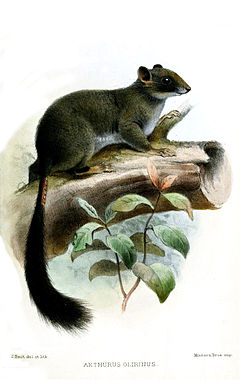Anomaluridae
| Anomalures Temporal range: Late Eocene–Recent |
|
|---|---|
 |
|
|
Zenkerella insignis, the Cameroon scaly-tail Artist: Joseph Smit, 1898 |
|
| Scientific classification | |
| Kingdom: | Animalia |
| Phylum: | Chordata |
| Class: | Mammalia |
| Order: | Rodentia |
| Suborder: | Anomaluromorpha |
| Family: |
Anomaluridae Gervais in d'Orbigny, 1849 |
| Genera | |
Anomalurus
Idiurus
Zenkerella
†Kabirmys
The Anomaluridae are a family of rodents found in central Africa. They are known as anomalures or scaly-tailed squirrels. The seven extant species are classified into three genera. Most are brightly coloured.
All anomalurids but the single species in the genus Zenkerella have membranes between their front and hind legs like those of a flying squirrel, but they are not closely related to the flying squirrels that form the tribe Petauristini of the family Sciuridae. They are distinguished by two rows of pointed, raised scales on the undersides of their tails. The anatomy of their heads is quite different from that of the sciurid flying squirrels.
Most anomalurid species roost during the day in hollow trees, with up to several dozen animals per tree. They are primarily herbivorous, and may travel up to 6 km (3.7 mi) from their roosting tree in search of leaves, flowers, or fruit, although they also eat a small amount of insects. They give birth to litters up to three young, which are born already furred and active.
Anomalurids represent one of several independent evolutions of gliding ability in mammals. The others include the true flying squirrels of Eurasia and North America, colugos or flying lemurs of Southeast Asia, and the marsupial gliders in Australia.
...
Wikipedia
